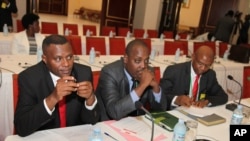Burundian civil society and opposition groups say they are concerned that scheduled peace talks to end the crisis in the East African country are unlikey to resume later this month because the facilitator has yet to consult with them.
The peace talks are scheduled for May 21 in Arusha, Tanzania.
The government in Burundi has signaled it is willing to talk with the groups to help end the country’s crisis.
But Vital Nshimirimana, leader of the civil society group Forum for Strengthening the Civil Society (FORSC), said opposition groups are not confident the peace talks will resume as planned.
Nshimirimana called on Ugandan President Yoweri Museveni, who is backed by regional leaders, to help mediate the peace talks between Bujumbura and opposition and civil society groups.
Advocates of unarmed civilians have also sought Museveni's help to end the crisis in Burundi.
Nshimirimana said civil society groups predicted political and security instability as the outcome of Burundi President Pierre Nkurunziza’s decision to seek a controversial third term.
Nshimirimana said he thought a break in the peace talks was to allow the facilitator to consult with the "main groups that are taking part in the peace talks, but this is not happening as wished."
Nshimirimana called on the United Nations to implement new measures to ensure the protection of civilians, who he says are mostly bear the brunt of the ongoing violence.
The concern raised by the groups follows a recent visit by members of the United Nations Security Council to assess the situation in Burundi -- the country's crisis has forced tens of thousands to flee into neighboring countries, including Tanzania and Rwanda.
“We are very concerned with the controversy at the United Nations Security Council, which visited Burundi and saw how the situation was too tense," Nshimirimana said. The group now cannot agree on the peacekeeping mission for Burundi, he added.
"We are in a situation where crimes against humanity, war crimes and acts of genocide are committed in Burundi. So people of Burundi deserve to be protected from those mass atrocities,” Nshimirimana said.
His comments came after opposition groups accused the government of using state security agencies to arbitrarily arrest young men – mainly in opposition strongholds -- who participated in demonstrations against the administration. There are allegations that some of the men have been tortured and, in some cases, killed.
Nshimirimana said there is video and photographic evidence of the violence in Burundi.
"Abduction, extrajudicial killings and other mass atrocities, which are committed by security forces in partnership with the Imbonerakure [the Kirundi word for “those that see far] militia and all are under the command of Pierre Nkurunziza,” he said.
The government has repeatedly rejected the accusations as without merit.
Officials of the administration have routinely denied ethnic-targeted violence against the opposition. The president's supporters blame the opposition and civil society groups for the unrest.




